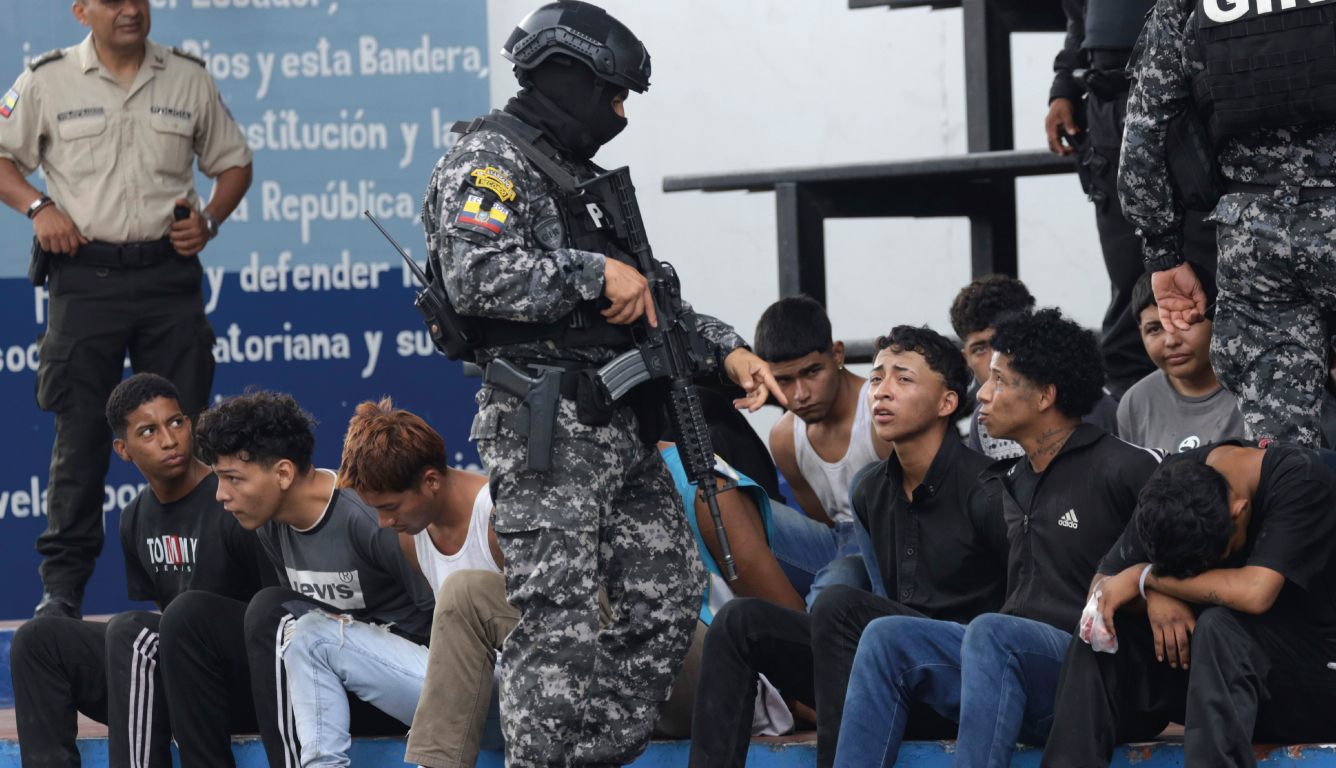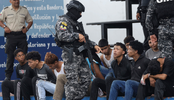Current discussions with the ongoing events in Ecuador.

Homicide statistics don’t tell the whole story about a country’s pattern of violence. But the record-setting figures seen in Ecuador in the past year underscore the depth of the security crisis driven by organized crime.
In 2022, Ecuador was the
tenth most violent country in Latin America and the Caribbean, after an astonishing 82% rise in murders compared to the previous year. In 2023, Ecuador is set to at least crack the top three, leapfrogging the likes of Honduras, Venezuela, and Colombia, as gangs fight to control the country’s drug flows.
In the main port and drug trafficking hub of Guayaquil, murders were up 80% by the end of November. In the inland province of Los Ríos, which is located on a route for moving drugs from the Colombian border to Guayaquil, homicides are up 153%. The northwest city of Esmeraldas has become one of the
deadliest urban centers in all of Latin America.
The scale of the violence and its causes – namely, fragmentary gangs fighting over large cocaine flows – are well understood. But authorities have struggled to mount an effective response.
The murder of a top gang leader
sparked the country’s gang war three years ago. Several more
openly targeted, well-known gang leaders were killed this year. Grisly displays of corpses hanging from bridges, once
unheard of in Ecuador, became more commonplace. Despite hundreds of prisoners dying in orchestrated massacres and repeated vows to improve security behind bars, riots kept
happening in 2023. Even the country’s highest-profile prisoners, the suspected assassins of presidential candidate Fernando Villavicencio, were
killed in their jail cell within weeks of their arrests.
The Wolves at the Door
While Ecuador has plenty of dangerous gangs, 2023 saw a winner emerge from the pack after a brutal three-year war.
The
Choneros, pioneers of Ecuador’s
drug trafficking scene who ran cocaine from Colombia to Guayaquil for close to two decades, have been battling a group of three allies, led by the
Lobos. The war, which began in 2020 and ended this year, was bookended by the murder of two Choneros leaders, alias Rasquiña in December 2020 and
Junior Roldán, alias “JR,” last May
In the wake of their victory, the Lobos have become the engine of Ecuador’s criminal machine. “They control the transport, storage, and trafficking routes for cocaine through the country, and contaminate containers to take it to other countries,” said Max Campos, a security analyst and Ecuador’s former deputy interior minister.
The group has cemented its takeover of Ecuador’s criminal scene by adapting to new opportunities.
“The Lobos have become
specialized in other areas like illegal mining, extortion, and human trafficking. They have continued changing and evolving,” Campos said.
SEE ALSO: 4 Reasons Why Ecuador Is in a Security Crisis
For example, the group expanded a
lucrative illegal gold mining business in the province of Imbabura, thanks in part to a corruption network backed by local government, military, and the police, according to an
investigation by Ecuadorian media, Periodistas sin Cadenas.
These connections may run deep. In November, an alleged Lobos leader was
arrested in the city of Puerto Bolivar. Weapons, ammunition, and thousands of dollars in cash were found in his car. A police station in the city was fired upon by alleged Lobos members shortly afterward. Yet, the gang member
walked free without charge within hours.
Furthermore, the Lobos have entrenched themselves as crucial partners in the drug trade to both North America and Europe. They acquire and transport tons of cocaine annually, using connections with their Colombian partners, especially the
Oliver Sinisterra Front (Frente Oliver Sinisterra), a splinter group from the now-demobilized Revolutionary Armed Forces of Colombia (Fuerzas Armadas Revolucionarias de Colombia – FARC).
They then sell the cocaine to their
long-term associates in Mexico, the Jalisco New Generation Cartel (Cartel Jalisco Nueva Generación –
CJNG), as well as Albanian crime groups.
The Lobos have counted on the support of two other gangs, the Tiguerones and Chone Killers since 2020, but in 2023, more
details emerged of how this triumvirate operates. The Lobos’ dominance comes from territorial control, with operations stretching from the Colombian border all the way to Guayaquil. To do so, they coerced or removed any smaller gangs or family clans that controlled drug trafficking and extortion in these provinces. Young people from poor backgrounds are often forced to join or killed.
The Tiguerones dominate extortion. Police reports have blamed the Tiguerones for more than twice as many extortion attempts in the city of Guayaquil than any other gang. In urban and rural areas alike, the Tiguerones seem to extort everything that moves, including market stalls, delivery trucks, and clean water deliveries.
The Chone Killers are the heaviest. Based in the city of Durán near Guayaquil, they ensure that the drug shipments connected to the Lobos pass safely through the port city. The Chone Killers pioneered the worst displays of carnage Ecuador has seen, including
bodies hanging from bridges, amid a war with local rivals, the Latin Kings. The Chone Killers have been blamed for regular massacres in 2023, including six people shot dead on December 3 for allegedly refusing to pay extortion fees.
Institutional Apathy
In a 2022 survey, 75% of the Ecuadorian population
found the police unreliable. And 2023 was hardly a glorious one for Ecuador’s security forces.
The investigation into the murder of Fernando Villavicencio has not produced any major results beyond the quick arrest of the alleged triggermen, who were
themselves killed in prison. In Durán, schools have been closed due to the violence, some neighborhoods are essentially no-go zones. Major cities in Ecuador essentially
find themselves without local leadership.
Luis Chonillo, the mayor of Durán, a city of almost 300,000 people, was attacked on his first day in office in May and has rarely visited the city since. The mayor of Manta, a Pacific city of similar size which is key to the cocaine trade, was shot dead in July. Some initial arrests were made, but no more information has been released as to these investigations. Even President Daniel Noboa told the UN he receives daily death threats.
Thieves have been
lynched by mobs after police repeatedly didn’t attend crime scenes.
Ecuadorians have reasons not to trust the authorities. Police forces have been
infiltrated by organized crime in Ecuador, have sold their weapons to gangs, and acted as bodyguards for drug kingpins. Top police commanders were identified as “narco-generals” by the current US ambassador to Ecuador.
This corruption has come
amid years of neglect. Security budgets went unspent, leaving police vehicles broken down, and officers suffering from a critical lack of equipment and training.
As violence reaches new levels and security forces remain hamstrung, resignation is setting in. “It seems that the police and the Ministry of the Interior have learned to live with these [homicide] rates,” said Renato Rivera, coordinator of the Ecuadorean Observatory of Organized Crime (Observatorio Ecuatoriano de Crimen Organizado) attached to the Pan-American Development Foundation.
New President Faces Tough Decisions
Can Ecuador’s new president, Daniel Noboa, turn the situation around? He has less than 18 months to do so.
The 35-year-old was elected until 2025 to finish the term of former President Lasso, who stepped down amid a constitutional crisis. The new leader must choose his battles carefully: his National Democratic Action (Acción Democrática Nacional) party only has 14 seats in the 137-seat parliament.
In addition to these limitations, Noboa has flip-flopped on how
he wants to tackle the security crisis. On the campaign trail, he spoke about new job opportunities and community policing, encouraging young people at risk of gang recruitment to choose another path. But as he came to power, he took a more hard-line stance, promising to use the military to patrol ports, airports, and highways to crack down on gangs. He even plans to exile the most dangerous criminals on prison ships offshore.
However, these types of strategies have been used elsewhere without much success. Mexico and Honduras have relied on the military to put down gangs, but both countries remain among the most violent in the region. And while investment in jobs and rehabilitation is necessary, Noboa’s security plans don’t directly address the principal driver of gang violence: Ecuador is
awash with cocaine.
In terms of narcotics, Noboa’s policies are hardly groundbreaking. His main move since taking power has been to scrap guidelines that allowed Ecuadorians to carry up to 10 grams of marijuana, two grams of cocaine paste, and one gram of cocaine for personal use. Noboa said these rules encouraged small-scale drug trafficking, but they had been in place since 2013. This move will not make a dent in Ecuador’s current crisis, fueled by
record cocaine production in recent years, and seems more designed to appease a right-wing political base.
SEE ALSO: From Rhetoric to Reality on Ecuador’s Security Challenge
Yet Ecuadorians appear eager for drastic solutions, and candidates promising hard-line policies, including Noboa, finished the 2023 campaign
on an upswing. Some prominent analysts also support the idea.
“The laws in Ecuador must be updated, when we have uncontrolled and unequal violence by criminal groups,” said General Juan Jaramillo, a security analyst and former police commander for Ecuador’s northern border area.
“We have to forget about community policing, and start working toward… troops that prioritize forceful reactions and intelligence and counterintelligence tactics,” he told InSight Crime.
Yet, a month into his term in office, Noboa’s security plans have stalled. An idea to merge two ministries to streamline decision-making about security proved unpopular and was scrapped. The details of his security plan, named Phoenix, have not been released. How he plans to use the army is unclear.
Noboa may look for easier political wins to boost his chances of re-election. Less than a week after taking office, he
proposed a major economic reform plan as his top political priority. In comparison, key elements of Noboa’s security plan are lagging, including exactly how he will use the military.
But the longer major security overhauls are delayed, the more difficult it will be to turn around soaring violence.
“Organized crime groups like the Lobos receive instructions and training in the use and handling of large-caliber weapons. These are used to attack police and military precincts, showing their superiority over the power of the government,” said General Jaramillo.


